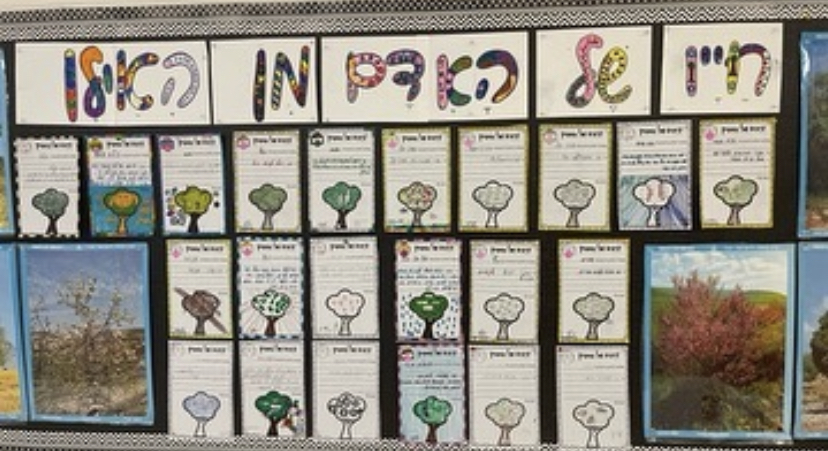
HEBREW LANGUAGE | עברית
Hebrew language/Ivrit is incorporated into our classrooms and daily school life. Beginning in Early Childhood, Ivrit is spoken frequently in and out of the classroom from greetings and directions to songs and holiday traditions. Students achieve increasing independence and skills as their vocabulary and familiarity with Hebrew language grows. In the Lower School, our teachers use the iTaLAM Hebrew language program and the accompanying books, songs, games, educational videos, and creative tools, to offer a Zionist-Jewish learning experience. Throughout the school, native Hebrew speakers and Israeli shlichim make our school an environment that embraces Hebrew and Israeli culture.

Curricular Goals
Grade 1
Building upon the foundations acquired in Early Childhood, Hebrew language learning in first grade focuses on the aleph-bet. Students learn to recognize, pronounce, and link Hebrew letters and vowels. The iTalam curriculum is the basis of Hebrew language instruction. iTalam is a research-based program that is rich with leveled texts, workbooks, visual aids for the classroom, music, online apps, videos, and more. With the sequential introduction of each letter, students’ basic Hebrew vocabulary grows. Hebrew reading (k’riyah) is a core goal of first grade. Using developmentally appropriate texts, students’ ability to read develops. Because students are simultaneously learning to read in two languages with different alphabets and different directionality (Hebrew is read right to left), repetition and practice reading and writing is a necessity.
As in English Language Arts, first grade provides a print-rich environment in which Hebrew words are visible throughout the classroom. Students quickly learn the names of classroom objects and learn how to follow directions given in Hebrew orally and in writing.
Grade 2
Representing their growing proficiency in Ivrit, Chaverim B’Ivrit begins in the second grade. A multi-dimensional Hebrew program, instruction focus is on the four major language acquisition skills: listening, speaking, reading, and writing. This is achieved by immersing students in everything from classical Hebrew texts to Israeli music, poetry and drama.
The iTalam curriculum focuses on highlighting vocabulary and conversation that is used in the classroom and in the home. Through the integration of storybooks, interactive games, songs, and more, students learn how to talk and write about the cycle of their daily lives. The iTalam materials go beyond basic language skills to include and emphasize the Jewish laws and customs associated with everyday life and holidays. Daily reading at home helps develop reading and comprehension skills.
Students learn how to build sentences in the present tense using the correct form of the verb. Students become familiar with Hebrew pronouns and how to recognize and correctly use various word forms, differentiating between male/female, plural/singular forms of nouns, adjectives, and verbs. By the end of second grade, students will know all of their question words and be able to understand classroom instructions, and engage in simple conversations with their peers and their teacher.
Grade 3
As students are ready and entering Middle School, they progress to the Bishvil HaIvrit program. The iTalam curriculum focuses on highlighting vocabulary and conversation about being successful at home, with friends, and in school. Through the integration of storybooks, interactive games, songs, and more, students learn how to talk and write about their experiences. Using meta-cognitive strategies, students talk about their learning, memory, and personal strengths. Daily reading of TalAm storybooks at home helps develop reading and comprehension skills.
Students further develop their skills in building complex sentences in the present tense using the correct form of the verb. Using accurate verb-noun-adjective agreement is more of a focus. Students build sentences using their rapidly expanding vocabulary and begin to learn how to conjugate verbs in the past tense. By the end of the year, students have vastly expanded their ability to authentically engage in Hebrew conversation.
Grade 4
The iTalAm curriculum focuses on the theme of HaKitah HaMeuchedet, highlighting vocabulary and conversation about being unified as a community, including behavior, social conventions like manners and etiquette, and understanding personal internal and external qualities. Through the integration of storybooks, interactive games, songs, and more, students learn how to talk and write about their experiences. Daily reading of TalAm storybooks at home helps develop reading and comprehension skills.
Students further develop their skills in building complex sentences in the present and past tense using the correct form of the verb. They are also introduced to the future tense. A strong emphasis is placed on using accurate verb-noun-adjective agreement. Though students have been working with pronouns since first grade, they begin to develop an understanding for when pronouns are used in Hebrew and when they are implied by the form of the verb or adjective. By the end of the year, students have vastly expanded their ability to authentically engage in Hebrew conversation.



